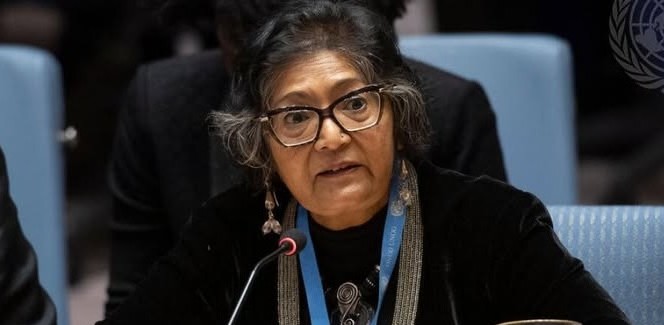
The United Nations Commission on Human Rights in South Sudan has urged the African Union and the United Nations Security Council to take decisive action to rescue South Sudan from what it called “a preventable fate.”
The call comes during its recent concluding mission to the African Union headquarters in Addis Ababa amid escalating conflict, mass displacement, and a potential breakdown of the 2018 peace agreement, which now lies fractured and unfulfilled.
“The crisis unfolding in South Sudan is the result of deliberate choices made by its leaders to put their interests above those of their people,” said Yasmin Sooka, Chair of the Commission. “The region and the international community must now prevail upon South Sudan’s leaders to make a different choice, one that puts their people first.”
The Commission’s urgent appeal for justice, accountability, and a credible political transition follows a damning report titled Plundering a Nation, which details how systemic corruption and the diversion of public resources have fueled conflict and denied citizens their most basic rights.
The findings paint a grim picture: renewed armed clashes have displaced over 300,000 South Sudanese in 2025 alone, with millions more internally displaced or seeking refuge in neighboring countries. Women and children bear the heaviest burdens, facing heightened risks amid collapsing services and protection mechanisms.
Despite repeated calls from the AU Peace and Security Council to establish the Hybrid Court for South Sudan, a key pillar of the 2018 Revitalised Agreement, no tangible progress has been made. The Commission emphasized that justice delayed is justice denied, and that the Hybrid Court must move “from paper to concrete action.”
“Credible and independent mechanisms for justice and accountability are needed to deter the repeated cycles of atrocities, break cycles of impunity, and heal the wounds of war,” Commissioner Carlos Castresana Fernández echoed this urgency.
As AU and UN Security Council members prepare to meet in Addis Ababa this week, the Commission’s message is clear: the time for diplomatic caution has passed. What South Sudan needs now is bold, coordinated action, not only to prevent another war, but to build the foundations of a just peace.
The story of South Sudan is still being written. Whether it becomes one of redemption or relapse depends on the choices made in the days ahead, by its leaders, its neighbors, and the international community. The people of South Sudan are watching. And they are waiting for a different choice.

